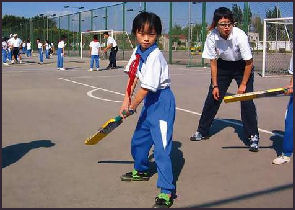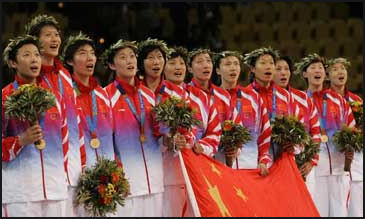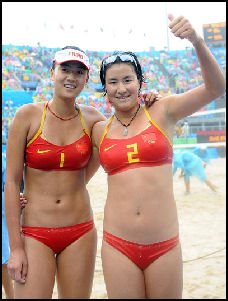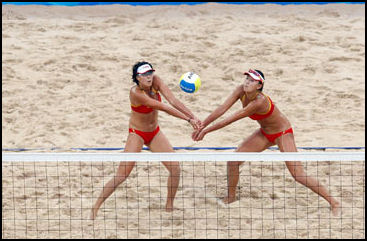TEAM SPORTS IN CHINA

Cricket in China Team sports such as basketball and soccer, and even American football, have become very popular in China. Basketball, soccer and volleyball are the most popular team sports. China manages to field a team for almost all the Olympic team sports. Its women’s teams often do very well.
Data from the mid-2000s suggests that basketball and soccer were roughly tied as China’s most popular sport with table tennis in third.Team sports have become popular in China relatively recently. British and American sports such as baseball, American football and cricket were vilified in the past as pastimes of imperialist lackeys and running dogs.
China does not have any significant sports leagues and many fans follow teams in foreign leagues in soccer and basketball and other popular sports.
Rich Chinese are increasing becoming players in the ownership of major sports teams. The Chinese businessman Kenny Huang, for example, owns a 15 percent stake in the Cleveland Cavaliers, which he purchased in 2009, and offered to buy the Liverpool soccer teams for $374 million but later withdrew the offer. The first Chinese college graduate China to work the New York Stock Exchange (in 1988) , Huang is co-chairman of both the National Basketball League of China and the Chinese Basketball League and cofounder of Sports-Corp China, which is the New York Yankee’s exclusive marketing partner in China.
Cricket and American Football in China
United States sports organizations are increasingly looking to China for talents and new markets to exploit. The NFL broadcasts edited games, holds tutorials and has simplified the rules of football for beginners. It sent some star players and hot, busty cheerleaders to China in its bid to make inroads there. Even World Wrestling Entertainment is trying to establish itself in China.
The NFL scheduled an exhibition game in China in August 2007 but then postponed it. It failed to bring the game to China in part because the game was announced before approval by the Chinese Party was granted and the party, many believe, didn’t grant permission to teach the NFL a lesson.
The National Football League (NFL) is trying to introduce American football to China. It has had limited results broadcasting games and shows that explain the rules and is currently putting the thrust of its effort into a television show that follows the Taiwanese heavy metal group Mayday as it is exposed to the sport during a trip to the United States. The show is aimed at teenagers and young adults that have an interest in American culture.
The NFL is making some progress. In 2009, 2.2 million people in China watch the Super Bowl on television, up from 400,000 the year before, and this was achieved with the game starting at 6:00am Beijing time.
Notre Dame and Stanford may play a college football game in China in 2013 The New York Times has reported. The Chinese game would be the first ever American football event in China and would represent a major step forward for college football and open up a potentially lucrative tie with China. Colleges are competing against each other to open campuses in China and the success of a football game there could be huge for The Fighting Irish, according to Notre Dame sources. Stanford already has deep links to Asia and the fixture in China would make perfect sense to them as well.
China’s first national cricket tournament was held in 2007. At total of 59 men’s and 19 women’s teams took part. The final featured a match between teams from Fudan University and the Shenyang Sports Institute. In 2004, when the Chinese Cricket Association was founded, there were no cricket teams in China. By 2007 there were 155.
India is involved in trying to promote cricket in China. The Board of Control for Cricket in India has sent balls, bats and other equipment to China. There are also plans to send umpires and groundsmen from the National Cricket Academy in Bangalore. The primary motivation of the endeavor is said be to profit.
Volleyball in China

2004 gold-medal-winning team
The Chinese woman's volleyball team gave China its first world championship in any sport, when they won the world championship in 1981. They then won the world championship five more times in the 1980s and the 1990s (1984, 1986, 1988, 1990 and 1992) and won the 1984 Olympic gold medal under the dictatorial coach Yuan Weimin who was notorious for forcing his players to repeatedly dive on wooden floor seven days a week, 10 hours a day. The Japanese women have also won the world championships a record five times (1966,1969, 1972, 1978 and 1981).
“Volleyball is becoming very popular in China,” said Wang Yimei, a hard-hitting 22-year-old spiker. “We have a lot of good young players in China, and I think this event is having an impact on them.” In 2011, China was ranked No. 3 in the world.
The victory by the Chinese women’s volleyball team in the 1981 World Cup is seen as a turning point in Chinese sport as China emerged from the Cultural Revolution. One fan of the team told the New York Times in 2008, “Even now I can feel the excitement from the volleyball victory. We celebrated because at that time many years ago we didn’t have much entertainment to watch.”
China won the gold medal in women’s volleyball at the Olympics in Athens in 2004. The team came back from being two sets down to beat Russia in the finals. It was their first medal since a silver in 1996 and their first gold since 1984. The team was led by 197-centimeter-tall star spiker Hao Ruirui and playmaker and captain Feng Kun.
Weimin also revealed that in 2002 the Chinese women’s volleyball intentionally lost a match so they wouldn’t have to face a tough opponent.
In 2009 a senior volleyball official criticized the women's team for their self-centeredness and their “ideological problem” in spending too much time on the internet. Li Quanqiang, the deputy director of China's volleyball administration, blamed the players' lack of discipline for their poor performance at the sport's world grand prix in Japan last week. [Source: Tania Branigan, The Guardian, September 1, 2009]
“They spend too much time online after a match or training, are too self-centered and haven't enough direct and close interaction,” Li told the China Daily. “Some players stay up late in front of the computer and get distracted by the internet.”
Lang Ping
Lang Ping is one of the biggest sports stars in China. Known as the Oron Hammer, she led the Chinese team as player in the 1970s and 80s to four world championships and a gold medal at the 1984 Olympics. Lang was so famous stadiums were named after her and her face appeared on postage stamps. Her wedding in the 1980s to a team handball player was nationally televised. At the 1996 Olympics and 1998 World Championships she coached the Chinese women’s team to silver medals.
Lang was a powerful spiker, with grit, determination and perseverance, who symbolized China as it was emerging from the Maoist period. Her and her teams’ greatest moment was not the gold medal victory over the American team in the gold medal match at the 1984 Olympics in Los Angeles but their victory at the 1981 world championship when the team defeated the Soviets, Americans and the Japanese in Tokyo. Chinese sports expert Susan Browell called that series f victories “the turning point in the revival of national pride and patriotism and the end of the Cultural Revolution.”
Lang was born in 1960 and is nearly six-foot two. Even today she is so famous she can not go out to a restaurant or a movie without being mobbed. “I’m pretty tall. I can’t hide,” she said. In China she carefully disguises herself with a floppy hat and sunglasses. When she is recognized people often erupt in applause and push their children at her.
Lang Ping was the daughter of a policeman and a hotel manager. She started playing basketball at a sports school before switching to volleyball when she was 13. She told the Washington Post, “There was nothing to be happy about or not” in Mao’s China. “Life was simple and all persons were made to be the same.” She said she slept on a wooden plank and had just three sets of clothes.
“It was a huge deal for us to travel and we were really careful about everything we did,” Lang said, “because we were so scared people would just grab us and maybe take us away. We couldn’t go outside, couldn’t by buy our own food. We weren’t given any money. We always ate together and stayed together...We were trained like that to talk the same, act in a certain way. Our mind was less open then.”
Lang was voted Chinese athlete of the year six years in a row. Each time she was give a bicycle. She never received any money. Lang said, “At that time China wasn’t opened to the world that much. Since then, the Chinese people believed we could do better, not only in sports. To connect with the world, that is even more meaningful than sports.”
Lang Ping in the United States

Xue Chen and Zhang Xi in 2008
Lang goes but they name of Jenny in the United States, where she has spent much of the last decade and a half. In 1996 she enrolled at the University of New Mexico to study English. She told the Washington Post, “I wanted a normal life. Let’s go to the U.S., where volleyball is not too popular.” For a while she coached in Italy. She now lives alone in Colorado Springs. She is divorced. Her six foot two daughter lives in Orange County, California and plays on the junior national U.S. team and is known as the Great Wall of China.
Lang coached the U.S. women’s volleyball team in Beijing in 2008 that won a gold medal. She agreed to coach the American team in 2005. Before she did she asked people on her Chinese-language website for their opinions. The overwhelming majority supported her move, Before the gold medal match she said, “I will always be Chinese even though I wear another country’s colors.” On the Internet people accused her of being a traitor, coaching a rival rather than the Chinese team, and said if she had coached the Chinese team they would have won the gold medal rather than the Americans.
Volleyball at the 2008 Beijing Olympics

Xue Chen and Zhang Xi in 2008
Beach volleyball was a marquee event for Chinese fans and American television audiences. The games featured 10-second music snippets and emcee talk between points. Cheerleaders appeared during breaks in the action.
China won its first Olympic medal ever in beach volleyball. Wang Jie and Tian Jia won the silver medal and Xue Xhen and Zhang Xi won the bronze medal in the women’s event. Wang Jie and Tian Jia, who train in California and travel around with an entourage of eight people, were beat by Misty May-Treanor and Kerri Walsh 21-18, 21-18 in a rainy gold medal match. May-Treanor and Walsh, who won the gold in Athens in 2004, didn’t lose a set in the Olympics and extended their winning streak to 108 matches in a row. After the victory May-Treanor scattered the ashes of her deceased mother from a plastic film canister on the court as she did when she and her partner won in Athens in 2004. Xue Xhen and Zhang Xi beat the Brazilian team 21-19, 21-17 to take their bronze medal after losing to Wang and Tian in the semifinal.
The women’s volleyball team defeated Cuba 3-1 to win the bronze medal after losing 0-3 to Brazil in the semifinal. After beating the Cubans 25-16, 21-25, 25-13, 25-20 the Chinese women jumped for joy and shed tears as if they had won the gold medal. China had lost to the Cubas in the qualifying round. One of the more embarrassing losses of the Beijing Games was the loss by the Chinese women’s volleyball team 2-3 to the United States in game attended by Chinese President Hu Jintao.
Field Hockey in China and the Daer ethnic group
Women made it the gold medal match in the 2008 Olympics in Beijing in field hockey but lost 2-10 to the Netherlands and ended up with the silver medal. The men went 0-4-1, tying New Zealand which had a strong team and leading every game they played. The Chinese field hockey team would not have been in the Olympics were China not the host country.
The Daur, an ethnic minority that lives in Inner Mongolia, have been playing a field-hockey-like game for more than a 100 years. The Daur game, called “beikou”, is played with long tree branches that have been sanded smooth and a knobby ball made from an apricot root. The game is still played by older people at cultural events. Younger players play field hockey.
The traditional game of beikou is played in traditional Daur clothes — boots, silk pantaloons, pointy hat, and long silk robes, belted with a sash — on a grassless hockey stadium, Describing a game played by men in their 60s, 70s and 80s, Charles McGrath wrote in the New York Times, “They played a game that in some ways resembled street hockey. They dribble the ball with both sides of the stick, and shouldered and interfered with one another far more than would be allowed in field hockey. They also laughed and shouted more than at a hockey game of an sort...At the end of two periods of roughly 15 minutes they came off the field barely puffing, even though it was a warm evening, and instead of looking for water, a number of them had a smoke.”
One player in his 80s told the New York Times, “I do this to keep healthy, and because I think it is the best part of Daur culture. We play fairly often — at all the festivals and whenever we are happy. Or because we are old, whenever we remember to.”
Many Daur live in Molidawa County in Inner Mongolia. A third of the players on the men’s Olympics field hockey team came from there. The local team from Molidawa has won five of the last 10 national championships before the Olympics. For a long time the national team was comprised mostly of Daurs from Molidawa County. Of the five members of the team from Molidawa, four went to the same elementary school. The best players come from Gansu Province. They belong to the Man ethnic group and grew up in Inner Mongolia.
Explaining why the skills that Daur possess make them good field hockey players, one Daur player told the New York Times, “Strength, cleverness, mental health, good coordination, flexibility. Hockey is different from football. Football players can stand up straight. Hockey players need to bend and run at the same time.”
China won a silver medal in women’s field hockey, its first Olympics medal ever in that event. It lost to Netherlands in the gold medal match
Rugby Taking Off in China?
In December 2011, AFP reported: “China's best known rugby union player Zhang Zhiqiang says the sport is finally taking off in his country but that a lot of work is needed to book a berth at the 2016 Olympics. "Rugby was a niche sport in China a few years ago when there were less than 1,000 people playing it," said the 37-year-old, also known as Johnny Zhang, the highest points scorer of all time at the Hong Kong Sevens.
"But ever since rugby was included in the National Games and the 2016 Olympics, the general public became more interested in it and participation grew as a result," he said. Rugby union will return at the Rio de Janeiro Games where the sevens version will be played.
"New teams are forming across provinces with the backing of the government and this is all good news for rugby in my country," said Zhang, in a press release from the Asian Rugby Football Union and HSBC. China currently ranks 62nd in the world in the sport.
Zhang said previously the game was mainly the preserve of international school students and foreigners, and Chinese people would often mistake it for American football. "Now, local kids are excited and proud of this sport, and are eager to learn and practice. You can see the passion and excitement in their eyes," he said.
Zhang said if China qualified for the Olympics "it will create even more awareness amongst the public.""I hope the players in the provincial teams can improve quickly enough to become key players representing our nation," he said. "Japan, Hong Kong and (South) Korea are the top teams in Asia and with probably just two slots available, we must work really hard to prove we deserve a place."
Image Sources: 1) Wideweb ; 2) Asian Biz
Text Sources: New York Times, Washington Post, Los Angeles Times, Times of London, National Geographic, The New Yorker, Time, Newsweek, Reuters, AP, Lonely Planet Guides, Compton’s Encyclopedia and various books and other publications.
Last updated April 2012
